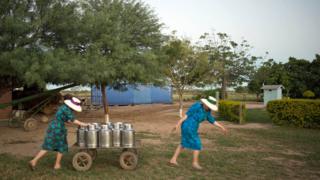
Mennonite women in Colonia Oriente, Bolivia
In Manitoba, an insular Mennonite colony in Bolivia whose residents eschew modernity, nine men were rounded up in 2009. Later, they were convicted of the rape and sexual assault of 151 women and girls – including small children – within this small Christian community. So why are Manitoba’s leaders now lobbying to free the men from prison?
Unpaved dirt roads run alongside fields of soya and sunflowers and connect the far-flung houses of Manitoba, home to 1,800 people. Treads from the iron wheels of tractors are sunk deep into the mud – rubber tyres are prohibited on motorised vehicles, deemed too modern.
The hot, still air is occasionally stirred by the passing of a trotting horse pulling a buggy laden with women in wide straw hats and men in dark dungarees.
This is the principal form of transport in Manitoba. For members of the colony, driving a car or motorcycle is banned and punishable by excommunication by the bishop and ministers.
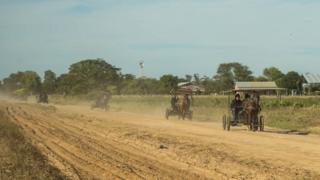
Buggies in Manitoba
To outsiders, it looked like a peaceful, if mysterious, haven from the modern world. Then in June 2009 the prosecutor for the district of Santa Cruz received a call from a police officer in the eastern Bolivian town of Cotoca.
“He told me, ‘Doctor, some Mennonites have brought men here who they’re saying are rapists,'” remembers Fredy Perez, the prosecutor who investigated the case.
“The image we have of Mennonites in Bolivia is that they work from six in the morning until nine at night, they’re very religious, and they don’t dance or get drunk. So when I got that call from the officer, I just couldn’t believe it.”
But in Manitoba, many people had for months – years even – lived with the knowledge that something was deeply amiss.
“In the night we heard the dogs bark, but when I went out, I couldn’t see anything,” says Abraham (not his real name), who was the father of teenaged daughters back in 2009.

“In the morning we couldn’t get up because we were half anaesthetised,” he recalls. We couldn’t move… We didn’t know what happened, but we knew something had happened.
And it wasn’t just once – they were here twice those men.”
While the whole family was drugged and incapacitated, all his daughters were attacked by men who broke into their home. At the time, shame prevented the girls from telling their parents.

Find out more
Listen to Bolivia’s Mennonites, Justice and Renewal on BBC Radio 4’s Crossing Continents at 11:00 on Thursday 16 May

“Due to their religious beliefs, they thought something bad, something evil was happening in the colony,” says Perez.
“In the morning they had headaches… Women woke with semen on them, and wondered why they were without underwear. And they didn’t discuss it with neighbours in case someone said, ‘That house has the devil in it.'”
Eventually, some women began to speak out. And the stories multiplied.
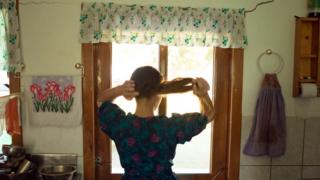
Mennonite woman in Colonia Belize, Bolivia
“Every day we talked about it, but we were worried about telling the authorities. We just didn’t know how to resolve things,” says Abraham.
Although the 90 Mennonite colonies are a powerhouse of Bolivian agricultural production, most are self-governing. Mennonites have their roots in 16th-Century Germany and Holland. They are pacifists, practise adult baptism and believe they must live a simple life. They came to Bolivia seeking religious freedom, land and isolation, and arrived via Russia, Canada and Mexico – always moving on when their autonomy was threatened.
But with numerous reports of sexual assault among such a tiny population, the people of Manitoba were confronted with a level of criminality so shocking that it could not be ignored.
In the end, events overtook the colony. One June night a decade ago, a young man was caught inside someone’s home. He was taken and held by some of the local men, and then implicated eight others – all Mennonite, all from Manitoba except one.
Abraham says that before they were handed over to the Bolivian police, the men confessed and gave detailed accounts of the attacks.
“They told me they’d broken in to my house and done whatever they wanted to. There were four of them.”
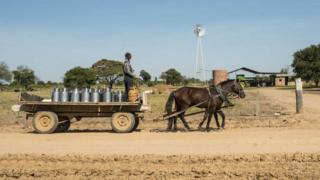
Once the story was out, his girls finally confided in their parents, confirming what the men had said.
“My daughters remembered something had occurred, but they didn’t know what. And they told us about pain they had had in their vaginal area and their legs,” remembers Abraham.
In court documents, these stories are amplified by other victims. Women and girls talk of being raped by different men one after the other; of finding a bloody rag that didn’t belong to them; of trying to scream, but being unable to.
So how had it happened? And why had Abraham and his children been almost unaware at the time?
The substance identified in the criminal rape case and allegedly used by the attackers to immobilise victims and their families comes from tropical plants. It is well-known in Latin America, and some Mennonite farmers on the continent apparently use it to anaesthetise bulls before they are castrated.
In Manitoba the men sprayed it through bedroom windows before they broke in. Its effect is dramatic, especially on memory. Someone might know something terrible has happened but be unable to recall it. Or it can render a person compliant, impotent to fight back.
Margarethe (not her real name), a grandmother, sits on the terrace of her home in Manitoba. The windows are obscured by security bars, a legacy of the rapes. Margarethe’s scrubbed, workers’ hands are crossed on her lap, her ankles crossed beneath her chair.
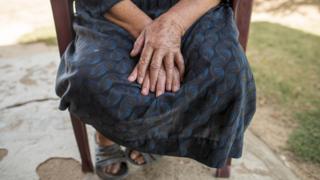
She speaks softly in her native Low German – a dialect hundreds of years old. Most Mennonite women and girls do not speak Spanish. Often confined to work in the home and on the farm from the age of 12 or 13, they have little contact with Bolivians, and are not taught Spanish during their few years of schooling.
“I can’t even put into words how terrible it was,” Margarethe says, recalling that period ten years ago, when life in Manitoba was dominated by the sex attacks.
“They told us it happened more than once at my house – about five women were affected. I saw some people in the dark and I shone my flashlight at them, but I didn’t recognise them.”
After the story emerged, psychological support was offered to the rape survivors by Mennonite missionaries, among others. But the Bishop of Manitoba rejected help on the victims’ behalf and was quoted in the press saying, “Why would they need counselling if they weren’t even awake when it happened?”
Meanwhile, the prosecutor was working to get survivors to co-operate in the forthcoming trial.
“It was very difficult to get them to testify,” says Perez. “Many times the women said, ‘No we don’t want to,’ and they’d start to cry. And I would say to them, ‘But if you don’t co-operate, I won’t have any witnesses. So the men will be acquitted, and they’ll return to the colony.’ That would make the women and girls cry even more.
“Mennonite culture is pretty sexist. And apart from that, the women are shy, and don’t want contact with the outside world.”
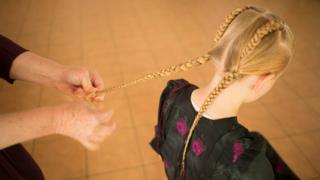
Mennonite girl has her hair plaited in Swift Current, Bolivia
But they overcame their upset, and in 2011 the trial began.
The power of the testimony she heard in the court room has stayed with Gladys Alba, one of the judges in the case: “They had the courage to confront their abusers and accuse them face to face. That’s what impressed me.”
And she believes there may have been many more victims.
“In spite of the fact there were so many in the case, there were other stories that weren’t part of the process, and there was talk about men who were victims as well.”
Perez agrees that the numbers affected – especially related to women and girls – could be much higher.
“It could be more than 200,” he says. “But some of those victims remained hidden because of cultural factors. They didn’t go, or weren’t taken by their parents, for a forensic examination. It’s hard for a Mennonite woman to get married if she’s had sexual relations. So, many parents preferred to keep quiet and say, ‘Nothing happened in this house.'”
One of the accused escaped soon after being arrested, so eight men stood trial. In August 2011, seven were sentenced to 25 years in prison for rape. The other one – who has since been conditionally released – got 12 years for supplying the drug used to debilitate the victims.
A further two men were tried and convicted in connected trials. After one of the men died, eight remain incarcerated on the outskirts of the city of Santa Cruz.
In that sprawling prison complex called Palmasola, 7,000 Bolivian men are locked up behind high concrete walls. Conjugal visits are allowed, and at least two of the Mennonite convicts have found partners and started families since they were incarcerated. All of the Manitoba men continue to deny they are rapists.
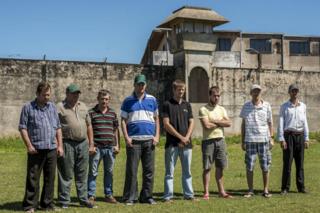
The eight remaining Mennonites incarcerated in Palmasola prison
So why would the women and girls lie?
“Simply because they were obliged to accuse us by their parents,” says Franz Dyck, one of those convicted, who is 31 now. “They even took them to a school to teach them Spanish so they could accuse us directly in court.
“I think we were accused because we’re poor – we couldn’t defend ourselves. When I was taken prisoner in Manitoba I was a virgin. I told them all the allegations were lies but they locked me inside a container, without any evidence. They threatened me, and kept me for almost a week in the colony until I was taken to a police cell.”
It is not unusual for prisoners to deny they committed a crime. But what is rare about this case is that Mennonites from many different sections of the community – the most liberal and the most conservative, in Bolivia and in North America – continue to air doubts about the convictions of the Manitoba men.

There are different narratives. Some say the accused men were unpopular in Manitoba, and the colony paid off the Bolivian judiciary to keep them in prison. Others believe the men were fall-guys – cover for a wider culture of familial sexual abuse. Many doubt the use of that powerful narcotic spray.
Perez bats off the theories and he dismisses claims the men were forced to confess to rape under threat of torture.
“That was their version,” says the prosecutor. “But they wrote those confessions in their own language stating which houses they broke into and who they’d raped. And what they wrote coincided with the results of forensic examinations of the victims – those same girls and women were found to have been raped in the homes the men identified.”
Gladys Alba has no doubts about the case she tried.
“What we did was right,” says the judge. “Justice was done.”
Today in Manitoba, on the surface at least, life remains the same.
At the end of gravel drives, in front of simple homes, milk churns await collection by the colony’s dairy co-operative. Men and boys work out in the fields, women and girls spend their days cooking, washing, cleaning and making the clothes prescribed by the colony’s leaders.
Mennonites believe it is hard work that will open the gates of heaven for them. The rules in Bolivia’s old colonies are harsh. Mobile phones are burnt if they are discovered and young people may be beaten savagely for transgressions like listening to music.

Mennonite school in Colonia Belize, Bolivia
Even so, wrong-doing can be forgiven. This is why Manitobans like Bernard Dyck, a farmer in his 50s, would like to see the men released from prison in Palmasola.
“We would welcome them back with great pleasure,” he says. “And if they need anything, we’d like to help them. Our ministers always say we have to forgive, even if someone’s committed a crime, that’s why they’ve sent people to find out if the men can be freed.”
Unsurprisingly, the lobbying by Manitoba’s leaders is creating tension within the colony. Aganetha (not her real name) is very upset, her eyes watery behind steel-rimmed glasses. And she is frightened.
“A lot of people support the men in Palmasola. And if we – the victims – talk, those men in prison will hear, and families will be threatened.”
Mobile phones might be banned for conservative Mennonites, but inside Bolivia and internationally, this is a community that is very connected, with stories appearing on WhatsApp quickly becoming common currency.
Abraham, the father of teenaged girls who were raped, is also rattled by moves to free the men.
“A little while ago the men were threatening people from jail, saying what they would do when they got out,” Abraham says. “The authorities of the colony want them released, and I say no, because they’re continuing to make threats.”

Critics claim conservative Mennonite colonies often fail to distinguish between a sin and a crime, so that in instances of sexual abuse, perpetrators are forgiven if they say they are sorry.
Johann Fehr, one of Manitoba’s ministers, denies this.
“Rape is one of the biggest sins,” he says. “And it is a crime – it is not something we can resolve within the colony.”
But ministers are not just pushing for the release of the men from Palmasola because they believe 10 years in prison is punishment enough. Johann Fehr says some of the victims’ testimony may be false.
“Some of those who’ve come here have mentioned that many of the girls who’re now adults are willing to testify in favour of the men”, says Manuel Baptista, the sentencing judge for the district of Santa Cruz, who has received a steady stream of those advocating on the men’s behalf.
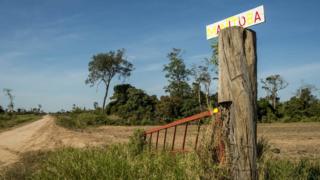
“Their sentences could be revoked if it were proven scientifically or through new evidence that the men didn’t commit those crimes. But that would have to happen through a new legal case.”
To date, he says, there have only been inquiries – no new judicial process has begun. But is he worried women living in a very patriarchal set-up might be coerced into changing their testimonies?
“We can’t assume women are being pressured. This question would be better put to the judge if a new case is opened.”
As it stands, the men serving 25 years cannot be considered for conditional release until they have served two-thirds of their sentence – that is 16 years and eight months.
Forgiveness is at the heart of Mennonite religious belief. But for some of the women of Manitoba, the colony’s determination to free the men jailed a decade ago, may already represent a profound test of faith.
All photos by Jordi Busque @jordibusque
You might also be interested in…
Norwegian police have documented 151 cases of sexual abuse, including child rape, in one small community of 2,000 people, north of the Arctic circle. The offences occurred over decades – between the 1950s and 2017 – but were only recently uncovered. How could such serious sex crimes go unchecked for so long?












